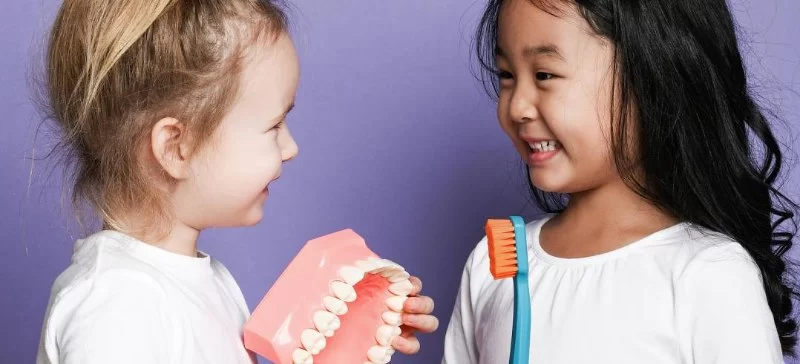
1. The Importance of Oral Hygiene for Children
Oral hygiene plays a critical role in your child's overall health, yet it’s often overlooked in daily routines. While brushing your child's teeth may seem like a simple task, the benefits of good oral hygiene extend far beyond preventing cavities. Establishing strong oral hygiene habits early on is essential to ensure your child has healthy teeth and gums throughout their life.
Children are particularly susceptible to dental problems, such as tooth decay and gum disease, because their immune systems and teeth are still developing. Without proper oral hygiene, bacteria and plaque can build up on their teeth, leading to a host of dental issues, including pain, infection, and misalignment of teeth. By teaching your child good oral hygiene habits, you can set them up for a lifetime of healthy smiles.
2. How Oral Hygiene Affects Children's Teeth and Gums
The most obvious effect of poor oral hygiene is tooth decay. Children are at a high risk of developing cavities because of their fondness for sugary foods and drinks. When children consume sugary snacks or drinks, bacteria in the mouth feed on the sugar and produce acids that erode tooth enamel. This process can lead to cavities, which, if left untreated, can lead to pain, infection, and the need for costly dental procedures.
Gum disease is another concern linked to poor oral hygiene. Gum disease, also known as gingivitis, occurs when plaque and bacteria build up along the gum line. In children, gingivitis can lead to swollen, bleeding gums, which may cause discomfort and difficulty chewing. If left untreated, gum disease can progress to more severe conditions, such as periodontitis, which can damage the structures that support the teeth.
3. Early Signs of Poor Oral Hygiene in Children
Recognizing the early signs of poor oral hygiene in your child is crucial for taking action before problems become more severe. Here are a few signs to watch out for:
- Bad Breath: Persistent bad breath (also known as halitosis) can be a sign of a buildup of bacteria in the mouth due to poor oral hygiene.
- Yellow or Brown Teeth: Discoloration of your child's teeth can be caused by plaque buildup and early stages of tooth decay.
- Bleeding Gums: If your child’s gums bleed while brushing or flossing, it may indicate the presence of gum disease.
- Tooth Sensitivity: Sensitivity to hot or cold foods and drinks may suggest cavities or enamel erosion.
If you notice any of these signs, it’s important to consult a dentist for guidance and treatment. Early intervention can prevent more serious issues from developing.
4. Tips for Promoting Good Oral Hygiene in Children
Building good oral hygiene habits in your child can be a fun and rewarding experience. Here are some practical tips to help you encourage good dental care habits:
- Brush Teeth Twice a Day: Make brushing a part of your child’s daily routine. Brush your child's teeth twice a day, once in the morning and once before bed, using fluoride toothpaste. Make sure to brush for at least two minutes to remove plaque effectively.
- Supervise Brushing: Children under the age of 6 may not have the manual dexterity to brush effectively on their own, so it’s important to supervise their brushing to ensure they are doing it properly.
- Floss Regularly: Flossing is essential to remove food particles and plaque between teeth. Begin flossing your child’s teeth as soon as they have two teeth that touch.
- Limit Sugary Snacks: Reducing your child's consumption of sugary foods and drinks can help prevent tooth decay. If your child enjoys sugary treats, encourage them to drink water afterward to rinse away any residual sugar.
- Regular Dental Visits: Take your child for regular dental checkups every six months. These visits allow the dentist to monitor their dental health and catch any potential issues early on.
5. The Role of Parents in Teaching Oral Hygiene
Parents play a vital role in shaping their child’s oral hygiene habits. Starting early and modeling good habits is the key to success. Be a positive example by brushing and flossing your own teeth regularly, and involve your child in the process by making brushing fun.
Incorporate fun, child-friendly oral hygiene products, such as flavored toothpaste, colorful toothbrushes, and brushing apps to make the routine enjoyable. You can also use rewards or incentives to encourage your child to brush their teeth regularly. Make sure to be patient and consistent, as building habits takes time, especially for young children.
6. How Poor Oral Hygiene Affects Long-Term Health
Establishing good oral hygiene habits in childhood has lasting effects on a child's overall health. Poor oral hygiene can lead to dental issues such as cavities, tooth loss, and gum disease, but it can also contribute to other health problems. Research has shown a link between poor oral hygiene and various conditions such as heart disease, diabetes, and respiratory infections. Therefore, maintaining good oral hygiene in children not only ensures a healthy smile but also contributes to their overall well-being.
7. Real-Life Story: A Parent’s Experience with Oral Hygiene
Jessica, a mother of two, shares her experience with teaching her children the importance of oral hygiene. “At first, my kids were not interested in brushing their teeth, and I noticed that my youngest son, Alex, had started getting cavities. We made brushing a family activity and used fun tooth brushing timers. Slowly, they began to enjoy it, and now they remind me if I forget to brush my teeth!”
Jessica’s story highlights the importance of consistency and creativity when introducing oral hygiene routines to children. Over time, Alex’s dental health improved, and he no longer needed cavities filled after regular checkups.
8. Conclusion: The Importance of Early Oral Hygiene Habits
Oral hygiene is a fundamental aspect of your child's health that should never be overlooked. Establishing good oral hygiene habits at an early age not only prevents cavities and gum disease but also lays the foundation for a lifetime of healthy teeth and gums. As a parent, you have the opportunity to guide your child toward making dental care a priority in their daily routine. By doing so, you can help them enjoy healthy smiles for years to come. For more tips and advice on kids’ dental care, visit Family Dentistry Online, where we provide expert recommendations and resources for healthy teeth.







 Dental Solutions Market Street4.0 (576 review)
Dental Solutions Market Street4.0 (576 review) Mesa Valley Modern Dentistry4.0 (344 review)
Mesa Valley Modern Dentistry4.0 (344 review) Washington Square Dental4.0 (121 review)
Washington Square Dental4.0 (121 review) Gregg W Jepson DMD5.0 (7 review)
Gregg W Jepson DMD5.0 (7 review) Growing Smiles of Voorhees4.0 (2464 review)
Growing Smiles of Voorhees4.0 (2464 review) Metropolitan Endodontics4.0 (78 review)
Metropolitan Endodontics4.0 (78 review) The Importance of Oral Health Education During Pregnancy for a Healthy Pregnancy
The Importance of Oral Health Education During Pregnancy for a Healthy Pregnancy Best Tips for Brushing Your Teeth Properly for Healthy Gums: Essential Techniques for Oral Health
Best Tips for Brushing Your Teeth Properly for Healthy Gums: Essential Techniques for Oral Health Why Skipping Dental Checkups Can Lead to Bigger Oral Health Problems
Why Skipping Dental Checkups Can Lead to Bigger Oral Health Problems Advantages of Porcelain Dental Restorations
Advantages of Porcelain Dental Restorations How Can Diabetes Cause Tooth and Gum Problems? Preventing and Managing Oral Health Issues
How Can Diabetes Cause Tooth and Gum Problems? Preventing and Managing Oral Health Issues Healthy Habits for Promoting Good Oral Health and Hygiene: Tips for a Healthy Smile
Healthy Habits for Promoting Good Oral Health and Hygiene: Tips for a Healthy Smile